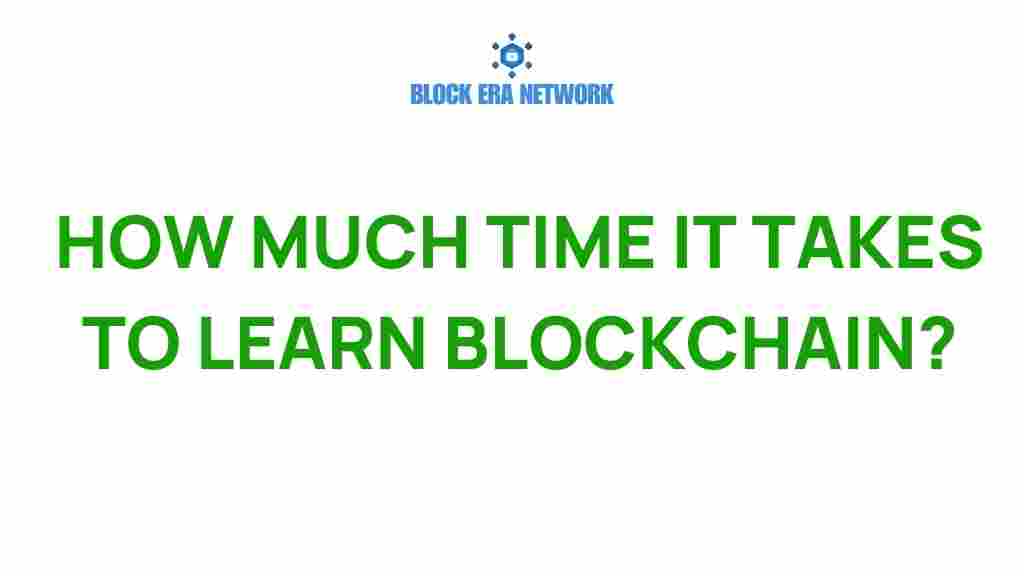Unlocking the Blockchain: How Long Does It Really Take to Learn?
The world of blockchain technology is evolving rapidly, and with it comes the need for individuals and organizations to grasp its concepts and applications. Whether you’re a developer looking to enhance your skills or a business professional seeking to understand the technology’s implications, the journey of learning about blockchain can be both exciting and daunting. But how long does it really take to learn blockchain? In this article, we will explore the time investment required for effective education in blockchain, the skills needed, courses available, and certification options.
The Importance of Learning Blockchain
Before diving into the time commitment, it’s essential to understand why learning blockchain is crucial. The technology is not just a trend; it is revolutionizing various industries, including finance, supply chain, healthcare, and more. Here are some reasons why investing time in education around blockchain is beneficial:
- Career Opportunities: As more companies adopt blockchain, the demand for skilled professionals is skyrocketing.
- Innovation: Understanding blockchain allows you to innovate and contribute to various projects.
- Investment Insights: Knowledge of blockchain can help in making informed investment decisions in cryptocurrencies.
- Problem-Solving: Blockchain can solve many existing problems in business processes and transparency.
Assessing the Time Investment for Learning Blockchain
The time it takes to learn blockchain varies significantly based on your background, learning style, and the depth of knowledge you wish to achieve. Here’s a breakdown of the time investment you might consider:
1. Basic Understanding (1-2 Weeks)
If you are entirely new to blockchain, a basic understanding of its concepts can be achieved in just one to two weeks. This includes:
- Understanding what blockchain is.
- Learning about how blockchain works (blocks, chains, nodes, etc.).
- Gaining insight into cryptocurrencies and their relationship with blockchain.
Resources such as introductory articles, videos, and online courses can facilitate this learning. A course like “Blockchain Basics” on platforms like Coursera or Udemy can quickly get you up to speed.
2. Intermediate Knowledge (1-3 Months)
- Understanding different types of blockchains (public vs. private).
- Learning about smart contracts and decentralized applications (dApps).
- Familiarizing yourself with blockchain platforms like Ethereum, Hyperledger, and others.
Intermediate learning can be achieved through more structured courses, such as “Ethereum and Solidity: The Complete Developer’s Guide” on Udemy. Joining forums and discussion groups can also enhance your learning experience.
3. Advanced Proficiency (6 Months to 1 Year)
For those looking to become experts in blockchain development or its business applications, a significant commitment of time is required. This stage can take six months to a year and may include:
- Deep diving into cryptography and consensus algorithms.
- Working on real-world blockchain projects.
- Learning programming languages commonly used in blockchain, such as Solidity for Ethereum or Go for Hyperledger.
Consider enrolling in comprehensive programs or boot camps that focus on blockchain development. Certifications like the Certified Blockchain Developer™ can also be pursued to validate your skills.
Popular Courses and Certifications
Investing in structured courses is a great way to learn blockchain effectively. Here are some popular options:
- Coursera: Offers courses from universities like Princeton and Stanford.
- edX: Provides professional certificates from leading institutions.
- Udemy: Features a wide range of courses for beginners to advanced levels.
- Blockchain Council: Certifies individuals in various blockchain domains.
For a comprehensive list of blockchain courses, visit Coursera for up-to-date offerings.
Common Challenges in Learning Blockchain
While the journey to learning blockchain can be rewarding, you may encounter several challenges:
1. Complexity of the Technology
Blockchain involves multiple complex concepts and terminologies. To overcome this:
- Take your time to understand each concept before moving on to the next.
- Use visual aids like infographics to grasp complicated ideas.
2. Rapidly Changing Landscape
The blockchain field is continuously evolving. To stay updated:
- Follow reputable blogs and news websites focused on blockchain technology.
- Engage with community forums and social media groups.
3. Lack of Practical Experience
Many learners struggle with the theoretical aspects without practical applications. To gain experience:
- Participate in hackathons or blockchain projects.
- Contribute to open-source blockchain projects on platforms like GitHub.
Tips for Effective Learning
Here are some strategies to enhance your blockchain education:
- Hands-On Practice: Build your own blockchain projects to reinforce theoretical knowledge.
- Join Online Communities: Engage with other learners and professionals to share knowledge and resources.
- Set Realistic Goals: Break down your learning process into achievable milestones.
- Stay Curious: Continuously seek out new information and advancements in the blockchain space.
Conclusion: The Path to Mastering Blockchain
In conclusion, the time it takes to learn blockchain varies greatly depending on your goals, background, and commitment. A basic understanding can be achieved in a matter of weeks, while becoming proficient may take several months to a year. With a plethora of resources, courses, and certification programs available, the investment in time and effort can pay off significantly. Embrace the learning journey, stay updated, and engage with the community to unlock the potential of blockchain technology.
Ready to start your blockchain learning journey? Explore available edX courses and take the first step today!
This article is in the category Blockchain Basics and created by Block Era Network Team
